If You Don’t See 1776, the Musical Prequel to Hamilton, You are a Damned Fool (5 stars PLUS)
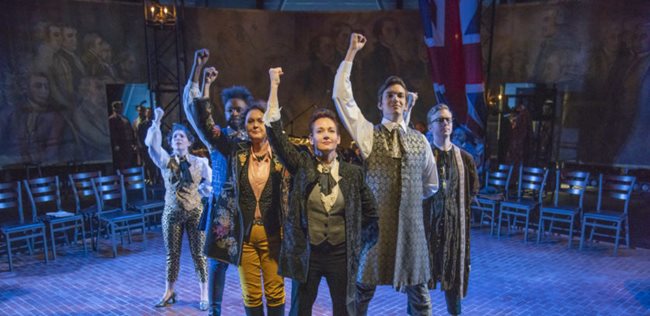
1776, by Peter Stone, with music and lyrics by Sherman Edwards, directed by Justin Pendelton and Kelli Edwards, with music direction by Todd C. Gordon, choreography by Kelli Edwards, Scenic Designer Cristina Todesco, Costume Designer Rachel Padula-Shufelt, Lighting Designer Alberto Segarra, Production Stage Manager Kevin Schlagle, and Assistant Stage Manager Brian M. Robillard, runs through December 30, 2018 at the New Repertory Theatre in Watertown, Massachusetts.
I’m one of the many people who can’t afford to see Hamilton, and if I did see it, I’m sure I’d want more. So it’s delightful that the New Repertory Theatre is running 1776, which is sort of a prequel to Hamilton. It’s the story of the Continental Congress, where representatives from the original 13 colonies discussed the question of independence from Britain.
We are lucky to live in an area of the United States with such heights of the arts. Because we’re so close to New York City, we forget that it’s rare in America that you can find strong theatres outside of a big city. New Repertory Theatre is one of the best, near Boston in Watertown, Massachusetts. Although the play takes place in Philadelphia, it has Boston at its heart. The play centers on John Adams from Massachusetts, who became our first president George Washington’s vice president, and then was our second president. You should visit the Adams home in Quincy and make the joke that it’s nothing like the Adaams Family movies.
The play is produced with a live orchestra of seven players, and, like Hamilton, a diverse cast of different genders and races. They even manage to sneak a gay relationship into the story. Surprisingly, it works so well that you stop noticing, with the same suspension of disbelief that you are not really in 1776 Philadelphia, or that with a play of puppets you stop thinking about the puppeteers.
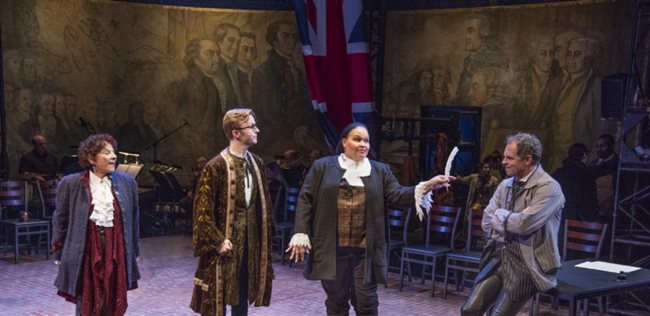
A diverse casts plays Franklin, Adams, and the other white rich men of the Continential Congress.
I caught myself grinning like a fool thinking, “This part is so great”, so often that the play is essentially a master class on how to write well. It’s a challenge to write a play about a room where 20 men gather, but Stone and Edwards simplify the character arcs into archetypes (another good example of this is the play and movie 12 Angry Men). Georgia’s Lyman Hall (Alexander Hatcher) is an everyman. Pennsylvania’s John Dickinson (Aimee Doherty) is the villain. Rhode Island (Rachel Belleman) is the comic relief. One of the characters with a fatal illness risks his life to travel. They all get their personal stories concluded neatly.
Kudos to Pier Lamia Porter, who plays Richard Lee, who revels in causing mayhem. Jefferson (KP Powell) is played too detached and emo rather than simply quiet and respectful, but one understands that his character is held back so that later on in the play he can deliver a great first line and then eventually speak up to defend the abolition of slavery. (In real life, Thomas Jefferson owned 600 slaves, and only ever freed seven, so his views on slavery were mixed at best.)

The cast is strong, without a weak performance even in the supporting actors, and the revolution revolves around great chemistry between Benjamin Franklin (Bobbie Steinbach) as the amused elder statesman and the put-upon John Adams. John Adams is the downtrodden underdog, played brilliantly by Benjamin Evett. It is difficult to play a straight man, and I’ve heard that in the old Vaudeville days that a straight man would get paid better than the comedian. We laugh at Adams’ misfortunes and funny expressions of frustration when his colleagues oppose independence out of personal interest, lack of morals, fear, or would just rather drink. Evett makes Adams such a curmudgeon but also likable. That is a challenge! And there’s such intensity to his passion for revolution that it is a force of nature.
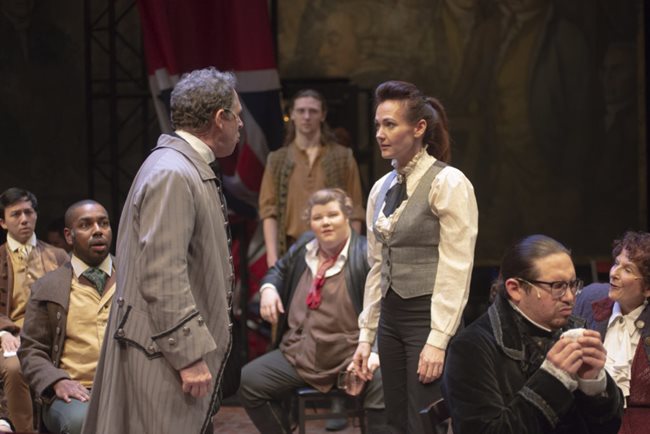
Speaking of intensity, for a play that is nearly 3 hours, there is great tension. One has to wonder historically whether the vote on independence was really so close, but it sure seems from the play like independence was at the brink of failure at every moment. It has all the tension of a Hollywood car chase packed into a room of dialogue and rebellion. If there was artistic license in setting a ticking clock, it works to create tension and move the plot along. (The play was written by a historian and is a true story with a few innocent simplifications.) At times there is sharp darkness, and in the darkest hour, when Adams sings “Does anybody care?” echoing the feelings of George Washington’s troops, who feel abandoned after more than a year of fighting without proper support, there were tears in the audience. I heard multiple people in the audience blowing their noses, and those were just the ones with the forethought to have brought tissues.
The irreverent play does not shy away from the darkness of some of the members of the Congress. The play turns on the issue of slavery, and whether abolition will be part of the Declaration of Independence. Spoilers: it won’t be, but the play explains why in a way that has depth instead of a cardboard evil vs. good., and how the Northern states played their own role in slavery by carrying slaves on ships and buying slave-produced goods. You also see how, at the Constitutional Congress, each state is essentially its own nation, with the smaller states getting equal votes (disproportionate power) in a way that we are still feeling today regarding, for example, representation in the US Senate.
The play’s irreverence also builds into heights of comedy. It illustrates how muddy and lazy the representatives could be. You’ll laugh out loud at the antics as John Adams wrestles his colleagues. There’s a running gag where Franklin, at the time of this play an elder statesman, keeps quoting himself pompously. The play makes fun with sexual innuendo, pompous egos, and strident idealism.
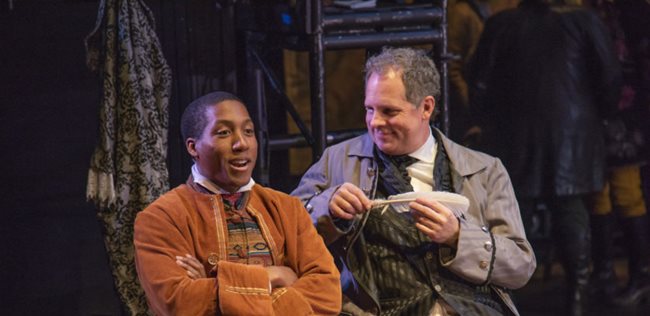
Vitally, 1776 is not just for brainiacs or historians. I saw the movie in a grade school class when I was nine and I loved and understood it. Stone and Edwards use the trick of having characters continually restating their goals and what’s at stake. So you never get lost. For example, Evett as John Adams uses a gesture of being hanged to highlight his saying that they may be hanged for treason if they lose the war.
As if that weren’t enough, 1776 also features notable, beautiful music that you’ll find yourself humming for a week. The play is not built upon constant music stopping the action, but rather given songs in the right places.
Thankfully the New Repertory Theatre cast are all given microphones, which must have been expensive, but even in a small theatre not requiring the cast to project their voices allows them more nuance. (I recently reviewed a student play without microphones in an even smaller theatre that occasionally had actors just shouting their lines without emotion.)
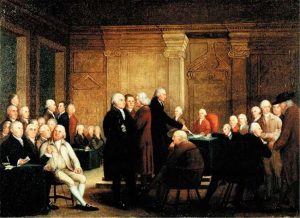
Congress Voting Independence
It’s unreasonable to compare a local stage play to the well-funded movie 1776 (in 1972), but a few nitpicks are possible in the New Repertory Theatre production. Its staging and lighting are unsophisticated and static. The stage is just a brick floor with chairs that get moved for a change of scene. Unfortunately, this didn’t work when the action moved to Jefferson’s home, leaving viewers confused as to setting. And why are Jefferson and other actors watching a private conversation happening outside his home?
It was also not clear that the interaction between John Adams and Abigail Adams was through letter-writing. The actors don’t touch but make eye contact and very much seem to be in the same place, without quills or letters in hand. The sound balance of the actors versus the live music was sometimes off. There’s was no vote tally board to help the audience follow the voting. (To be fair, such a tally board was an addition to the stage play; the Constitutional Convention did not have one.) Actors occasionally flubbed their dialogue. And I was surprised they did not duplicate the powerful ending of the play where the actors of the Continental Congress pose like the famous portrait of Jefferson presenting his Declaration of Independence.
I understand purists, but to me, a production is responsible for the plays that it chooses and adapts, and 1776 is too long at nearly 3 hours. There’s even a song in the play about waiting! (The play was written by a historian with presumably a love for detail who could not bear to leave anything out.) So New Repertory Theatre might have adapted away a few scenes. We don’t need to see the founding fathers argue about the spelling of inalienable, how America got its national bird, or see each signatory signing the Declaration of Independence one at a time. The first song after intermission, a metaphor for hatching America from an egg, is unnecessary. Scenes where we get to know Jefferson through the perspective of his wife, and where we hear about the horrors of war on the distant battlefield, are engaging but not central enough to increase the length of the play. Still, I don’t mean to suggest that the play becomes boring. It keeps your attention throughout, and there is an intermission.
Forgive my nitpicks. New Repertory Theatre’s 1776 is inspiring, funny, educational, accessible to those who don’t normally see theatre or care about history, poignant, patriotic, and brave in not shying away from difficult topics — even braver the way it has a diverse cast. Despite my tiny complaints, the play contains such great music, such great writing with highs and lows of comedy, supported by solid or exceptional acting, that it easily deserves five stars. And because it’s about such an important topic, and has a connection to Massachusetts, I’ll give 1776 my rare five stars PLUS. If you don’t see this play, you are really missing out.